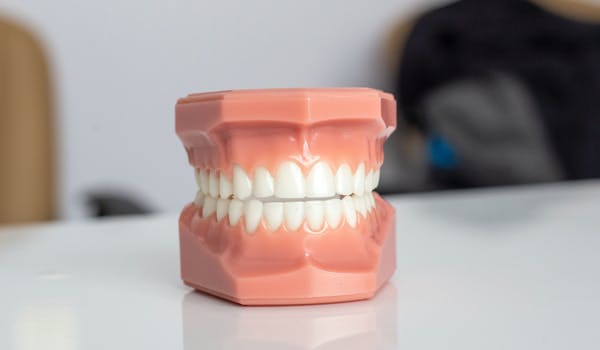What you need to know about teeth grinding
Have you ever woken up with an aching jaw and realized that you’ve been grinding your teeth while sleeping? If so, you are not alone. Teeth grinding, or bruxism is a surprisingly common condition. Fortunately, there are several steps that can be taken to reduce the effects of teeth grinding. Let’s take a look at what causes teeth grinding and how to treat it effectively.



What is bruxism?
Bruxism is an oral disorder that occurs when a person involuntarily clenches or grinds their teeth together, usually during sleep. It also involves unconscious, repetitive masticatory muscle activity in the form of tightening (or clenching) the muscles of mastication in the jaw and grinding the teeth. In addition, your teeth wear out faster and damage occurs to fillings, crowns and implants.
Causes of teeth grinding
There are many causes of bruxism. But it is often triggered by stress and anxiety, but also can be triggered by certain medications like antidepressants or even misaligned teeth. It is further related to jaw clenching, which is where you clamp your teeth hard together, but don’t actually grind. It may occur either during the day or during sleep. However, it most commonly occurs at night while sleeping. For example, by a sleep disorder such as sleep apnea. Unfortunately, many people who grind their teeth at night do not realize they are doing it until they experience the pain associated with the condition. This is why it is important to note any symptoms associated with teeth grinding in order to seek treatment before further damage is done.
Common symptoms of teeth grinding
The primary symptom of teeth grinding is a sore jaw upon waking up in the morning due to clenching and gnashing of the teeth throughout the night. Other common signs include headaches, earaches or neck pain caused by tension in the jaw muscles as well as increased tooth sensitivity due to enamel being worn down from excessive grinding. Some people may even find that their partner wakes up when they begin grinding their teeth due to its loud noise! This is called sleep bruxism. Other risk factors include sleep problems and stress management. Furthermore, if you have a family history of teeth grinding, you may face a higher risk.
What happens when you grind your teeth?
When you grind your teeth, you are putting a lot of pressure on them which can cause chips and cracks in the tooth enamel. This makes your teeth more susceptible to bacteria, decay and other oral health problems. Grinding your teeth can also lead to tension headaches, jaw pain and a decrease in overall dental health. It is important to seek treatment if you suspect you may have bruxism.
Teeth grinding can have a negative impact on your existing dentistry work. Fillings, bridges and implants can wear out, crack or lose their effectiveness in the mouth. In fact, teeth grinding is a common cause of dental implant failure.
What are the long-term side effects of teeth grinding?
The long-term effects of teeth grinding can be extensive and potentially detrimental to one's overall oral health. In extreme cases of prolonged teeth grinding, the enamel on the teeth can erode away and cause permanent damage to the tooth structure. This can cause tooth sensitivity and exposed dentin, which in severe cases can lead to loss of teeth.
Disorders that occur in the temporomandibular joints (TMJs), located just in front of your ears, which may sound like clicking when you open and close your mouth.
Treatment options of teeth grinding
Fortunately, there are several treatments for those suffering from bruxism. The first step is usually visiting a doctor or dentist for an evaluation to create an individualized treatment plan based on their specific needs. Common treatments include wearing a mouth splint or a mouthguard (night guard) while sleeping which prevents your upper and lower teeth from making contact with each other, reducing stress levels through relaxation techniques such as yoga or meditation, avoiding foods and beverages with high amounts of caffeine, and taking medications prescribed by your doctors such as muscle relaxants or anti-anxiety drugs which can help reduce cases of nighttime bruxism. In more extreme cases where extensive damage has been done to the individual’s mouth due to long-term bruxism, dental procedures such as veneers may need to be performed in order to repair worn-down enamels or cracked/chipped teeth resulting from excessive grinding habits over time. It is further important to have regular dental check-ups.
Relaxation exercises against teeth grinding
You can incorporate autogenic training into your daily routine as progressive muscle relaxation to counteract bruxism. Here you can find various exercises and massages to relax your jaw muscles and prevent the teeth from clenching.
Teeth grinding affects millions of people worldwide yet often goes undetected until serious damage has been done due to its silent nature and lack of visible symptoms during waking hours. However, there are several steps one can take in order to reduce its effects before serious damage occurs if caught early enough. If you suspect that you have been suffering from bruxism, then please consult with your doctor or dentist about available treatments for this condition before further tooth damage is done! You will soon find relief from this painful disorder with proper dental care and attention!



